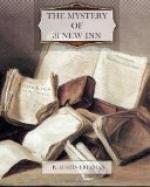Stephen Blackmore now took his leave; and Thorndyke, having collected the papers containing his notes, neatly punched a couple of holes in their margins and inserted them into a small file, which he slipped into his pocket.
“That,” said he, “is the nucleus of the body of data on which our investigations must be based; and I very much fear that it will not receive any great additions. What do you think, Jervis?”
“The case looks about as hopeless as a case could look,” I replied.
“That is what I think,” said he; “and for that reason I am more than ordinarily keen on making something of it. I have not much more hope than Marchmont has; but I shall squeeze the case as dry as a bone before I let go. What are you going to do? I have to attend a meeting of the board of directors of the Griffin Life Office.”
“Shall I walk down with you?”
“It is very good of you to offer, Jervis, but I think I will go alone. I want to run over these notes and get the facts of the case arranged in my mind. When I have done that, I shall be ready to pick up new matter. Knowledge is of no use unless it is actually in your mind, so that it can be produced at a moment’s notice. So you had better get a book and your pipe and spend a quiet hour by the fire while I assimilate the miscellaneous mental feast that we have just enjoyed. And you might do a little rumination yourself.”
With this, Thorndyke took his departure; and I, adopting his advice, drew my chair closer to the fire and filled my pipe. But I did not discover any inclination to read. The curious history that I had just heard, and Thorndyke’s evident determination to elucidate it further, disposed me to meditation. Moreover, as his subordinate, it was my business to occupy myself with his affairs. Wherefore, having stirred the fire and got my pipe well alight, I abandoned myself to the renewed consideration of the facts relating to Jeffrey Blackmore’s will.
Chapter VII
The Cuneiform Inscription
The surprise which Thorndyke’s proceedings usually occasioned, especially to lawyers, was principally due, I think, to my friend’s habit of viewing occurrences from an unusual standpoint. He did not look at things quite as other men looked at them. He had no prejudices and he knew no conventions. When other men were cocksure, Thorndyke was doubtful. When other men despaired, he entertained hopes; and thus it happened that he would often undertake cases that had been rejected contemptuously by experienced lawyers, and, what is more, would bring them to a successful issue.
Thus it had been in the only other case in which I had been personally associated with him—the so-called “Red Thumb Mark” case. There he was presented with an apparent impossibility; but he had given it careful consideration. Then, from the category of the impossible he had brought it to that of the possible; from the merely possible to the actually probable; from the probable to the certain; and in the end had won the case triumphantly.




